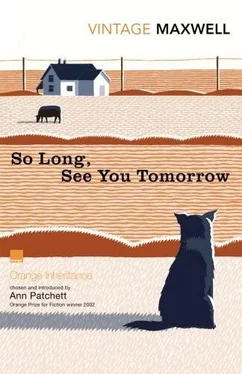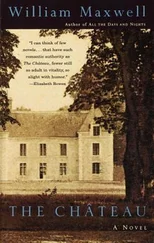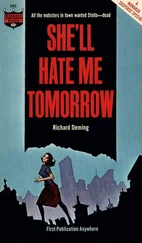Riding on the seat of the cultivator in the field that lay next to the road, Lloyd Wilson did not raise his head when Clarence drove by in the buckboard wagon, with Cletus on the seat beside him.
The two men met once, by accident, at the mailboxes, and after that they saw to it that they didn't meet anywhere. Though they were no longer on speaking terms they couldn't avoid seeing each other at a distance in the fields. And at night the lighted windows of one another's houses, once a comfort, only made them uneasy, since it was a reminder of all the things that were not the way they used to be.
Fred Wilson finished reading the evening paper and took off his glasses in order to rub his eyes. The family resemblance was apparent for a moment. "Weil, tomorrow's another day," he said, and stood up.
"Sleep well, Uncle Fred," Marie Wilson said.
"If I don't, I don't know whose fault it will be but mine," he said cheerfully, and went off to his room back of the kitchen. The children said good night to their mother, and then to their father, and went upstairs to bed. The clock ticked, loudly at times. A piece of wood collapsed in the stove. Lloyd Wilson was aware that the silence in the room was not of the ordinary kind, and braced himself. His wife rolled the sock she had just finished darning into a ball and said, "Has something happened between you and Clarence?" "No."
"You haven't quarreled?" "No."
"Then what is the matter?"
"I don't know."
"You mean you don't know how to tell me?"
He didn't know how to lie. To other people, yes, but not to her. He said slowly, "I guess that's what I do mean." He saw that her face was flushed and her eyes bright with tears. "We-"
"If it's what I think it is, I don't want to hear about it."
"What happened was that we—"
"I told you, I don't want to hear about it."
"— couldn't prevent it."
"And that makes it more comfortable for both of you, I'm sure. But don't ask me to believe it too. From now on you go your way and I'll go mine."
What she meant by this statement he didn't know and it didn't seem like a good time to ask. Their eyes met and with an effort he kept his glance from faltering. The accusing look and the missing front tooth were things he had not bargained for when he stood up before the minister. Or she either, he thought sadly.
Days went by and he had almost come to the conclusion she didn't mean anything by that statement, and that things had settled back into the way they were before, when she announced that she was going to take the children and move in with her sister in town.
He said the first thing that came into his head, which was "But you don't get on with her."
"I know. But she says she'll take us in. Blood being thicker than water."
He sat back and listened while she talked their whole married life out of existence. At no time did he argue with her or deny any statement she made. Finally, when there was nothing more to say, she picked up the lamp and went into the next room, and he followed her, and they undressed and got into bed as if nothing whatever had happened. After a while he said, in the dark, "You can take the girls but not the boys."
There was no answer from the far side of the bed.
He knew that even now he could persuade her to change her mind, but if he did—
"I have never before in my life been happy," he said, "and I will not give it up."
Because there wasn't room for everything in the buggy, they took with them only the baby's paraphernalia and what the rest of them needed for the night, and left the battered suitcases and an old leather trunk for him to bring the next day. Nobody spoke all the way in to town. When he pulled on the reins the little girls were ready and one by one jumped from the metal step of the buggy. Hazel stood waiting for her mother to hand the baby down to her. "Be good girls," he called after them but they were too frightened by what was happening to turn and smile at him. He waited until they had all disappeared into the house and then gave the whip a flick. He hadn't meant for things to go this far, and neither had he thought ahead to what might happen next. Coming back to the farm, his spirits lifted for no reason. Or perhaps because a thing hanging over them for so long had at last happened, clearing the air.
Fred never asked questions. The little boys couldn't understand why their mother wasn't there, and he didn't know what she might have said to them, so he told them to be quiet and eat their supper. In the night he heard Orville crying and got up and brought him into his own bed, where he dropped off instantly. But after that he let them cry themselves to sleep, hoping they'd get over it sooner.
He tried to be both mother and father to them, which wasn't easy. When Saturday night came round, he placed the washtub in the middle of the kitchen floor and filled it with warm water from the stove and they stood in it. He poured soapy water over their thin shoulders, as he had seen their mother do, and examined their ears for dirt, but his hands were not as gentle or as practised as hers and Dean looked at him accusingly and said, "You hurt me!"
"Do it yourself, then," he said. But he was damned if he was going to let them grow up in town, not knowing how to handle an axe or plow a straight furrow.
He heard about a widow woman over toward Harmon Springs who was living with relatives and dependent on them for her keep. She might be a little too old for the work but if he got somebody younger, people would talk. "I'll have to think about it," she said when he told her why he had come. She didn't have to think about it very long. As he was getting back into the buggy the front door flew open and she called out to him to wait while she gathered together a few garments. Settling herself on the seat beside him she said, "Just call me 'Mrs. B.'—everybody does." She meant everybody in Harmon Springs.
What with cataracts in both eyes and dizzy spells that came over her if she got down on her knees and poked with the broom in dark corners, the widow didn't do a great deal about the dust that blew into the house from the plowed fields or notice that the pots and pans had acquired a coating of grease. She loved to stand and talk, and one listener was as good as another. "Stop me if I've told you this before, I don't want to repeat myself," she said, but there was no stopping her, or even getting a word in edgewise.
Though she was grateful not to be living on the charity of cousins once removed who raised their eyebrows if she asked for a second helping of chicken and gravy, still the days were long and she wished that people would drop in more. To some she might appear just an ordinary farm woman, but her family had supplied the State of Tennessee with a congressman and a judge. "Well, ma'am, I know you must be right proud of them," Lloyd Wilson said on his way out the door.
It was more than she could do to keep track of his coming and going. Just when she thought he was going to settle down at last and she could dispose of the things she'd been saving up to tell him, he put his jacket on and left the house — to do what, since it was dark outside and the chores were done, she couldn't imagine.
"Pshaw," she said to the little boys as she went after them with a washrag. "If you expect to grow up a big strong man like your father, you can't object to a little soap."
It is not a crime to ask questions, especially indirect ones, and from Fred Wilson's reluctant answers the widow had no difficulty in putting two and two together. She also questioned the little boys about their mother, and said primly, "I hope I shall have the pleasure of meeting her some day."
They did not like her very much but at least she was a woman, she wore skirts, and so they leaned against her sometimes out of habit or when they missed their mother. They were very good about coming when she called, and the rest of the time they wandered around together as if they were afraid of being separated.
Читать дальше












